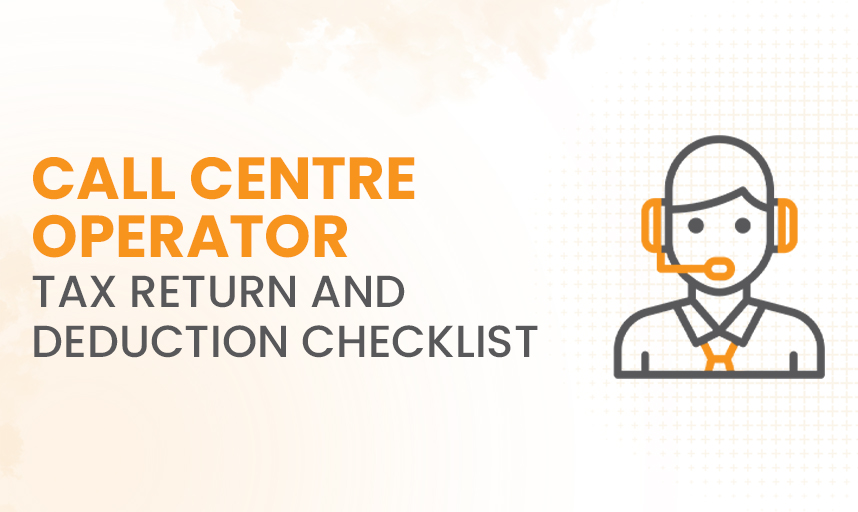Are you making the most of your tax return as a call centre operator? With various deductions available, ensuring you claim everything you’re entitled to can significantly impact your financial outcomes.
Let’s understand the key details and optimise your tax return for the year.
Completing Your Tax Return
As a call centre employee, initiating your tax return requires gathering essential documents such as your income statement. This statement outlines your earnings throughout the financial year and serves as a cornerstone for assessing deductions.
Partnering with tax professionals ensures meticulous attention to detail, minimising oversights and maximising returns.
Claimable Deductions
Understanding what expenses qualify for deductions is pivotal. Refer to the following table for a concise overview:
Understanding Call Center Tax Deductions In More Detail
The complications of call centre tax deductions can be tricky to understand. Let’s take a closer look at each area to make sure you get the most out of your refund:
Car Expenses:
- Logbook Magic: Maintain a detailed logbook recording odometer readings, dates, destinations, and reasons for travel. This allows you to claim the cents-per-kilometre method (currently 75 cents) or the actual cost method (fuel, repairs, depreciation).
- Multi-Job Flexibility: If you work part-time at another job or attend training, track journeys between these locations.
- Client Visits: Capture travel to client sites, even if it’s infrequent.
Clothing & Laundry:
- Logo: Only claim the cost of clothing with your company logo or specific requirements like safety gear.
- Cleaning Costs: If your uniform requires special cleaning, you can deduct those expenses.
Self-Education:
- Specificity Matters: Focus on courses directly related to your current call centre role, like customer service training or communication skills development.
- Keep Records: Save receipts, course outlines, and certificates for verification.
- Beyond Courses: Consider industry conferences, workshops, or subscriptions to relevant publications as deductible expenses.
Working from Home:
- Choose Your Method: Select the shortcut method (52 cents/hour), the actual cost method (tracking specific expenses), or the detailed method (proportioning household expenses based on work-related usage).
- Dedicated Space: If you have a dedicated home office, you can claim a portion of rent, mortgage interest, and utilities.
- Technology & Supplies: Deduct internet and phone costs (work-related portion), computer equipment depreciation, and essential office supplies.
Other Expenses:
- Union & Professional Fees: If mandatory for your job, these fees are deductible.
- Logbook & Diary Essentials: Deduct the cost of logbooks, diaries, pens, and stationery used specifically for work.
- Phone & Internet: If you use your personal phone or internet for work-related calls and data, claim the work-related portion based on usage records.
- Tax Management: Fees paid to a registered tax agent for preparing your return can be claimed.
- Meal Allowances: If your employer provides a meal allowance under an award or agreement, you can claim meal expenses exceeding the allowance amount.
- Travel & Accommodation: If you travel overnight for work-related conferences or training, claim accommodation and meals (within ATO limits).
- Subscriptions & Memberships: If relevant to your job, consider claiming subscriptions to industry publications or professional association memberships.
Maintaining Records
- Keep Records: Receipts, invoices, bank statements, and logbooks are crucial for substantiating your claims.
- Seek Professional Advice: For complex situations or personalised guidance, consult a registered tax agent or accountant familiar with call centre deductions.
- Stay Updated: Tax laws and regulations change, so keep yourself informed through the ATO website or qualified professionals.
Methods for Claiming Expenses
Following methods you can utilise as appropriate methods for claiming expenses to maximise returns efficiently:
- Shortcut Method: Simplify calculations by claiming 52 cents per hour for work-related activities at home.
- Actual Cost Method: Itemise specific expenses incurred during work-from-home periods.
- Specific Expenses: Deduct individual costs like phone bills and stationery purchases directly.
Additional Considerations
Beyond conventional deductions, you must also explore miscellaneous expenses that may qualify for claims:
- Union fees and professional subscriptions.
- Logbooks, diaries, and stationery.
- Costs associated with managing tax affairs.
Conclusion
By understanding your eligible deductions and keeping detailed records, you can significantly reduce your tax burden. This checklist empowers you to understand call centre tax deductions and claim your rightful refund.
But if you require professional advice and want to maximise your deductions, you can speak to the tax accountants at KPG Taxation! Their experts will take control of your tax issues and help you to potentially maximise your tax refunds.





